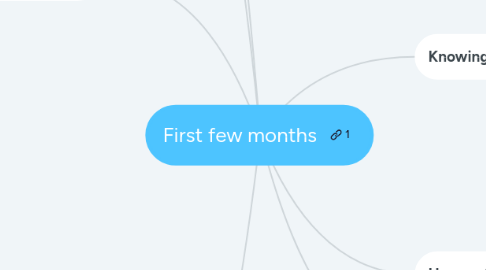
1. Knowing your data
1.1. If they're available, read reports that employees have written
1.2. Load the data and take a look at a few rows, and summary statistics
1.2.1. Will help you avoid "gotchas"
1.2.2. Figure out the overall shape of your data
1.3. Learn how the data got to you
1.4. Document data as you go along
1.5. Elin Farnell on academia vs industry
1.5.1. Academia
1.5.1.1. Research in a deep, narrow subfield
1.5.1.2. Significant autonomy
1.5.2. Industry
1.5.2.1. Solve a wide range of problems
1.5.2.2. Solve problems your employer wants you to solve
1.5.2.3. Work-life balance tends to be better
2. Have outsize impact on how the job goes
3. Fight instinct to get as much done as possible
3.1. It's not about developing the highest-performing model!
3.2. Instead ask questions early and how to approach work
3.3. Worry more about the process than the result
4. Meet with your manager to discuss priorities
4.1. Check whether you're spending your time on tasks that matter to your boss
4.2. Review with your manager after first 3 months
5. Becoming Productive
5.1. It will take longer, OK to be frustrated
5.2. Lot of cognitive load from being in a new environment
5.3. Position yourself to deliver value over the longer term
5.4. Show some in-progress work during your manager check-ins
5.5. Productivity strategy 1: Ask questions
5.5.1. Try to learn about the question culture at the company
5.5.2. Good to show that you've been proactive
5.5.3. Don't ask questions when you can find the answers quickly on your own
5.5.4. Find the experts and be thoughtful of their time
5.5.5. Avoid voicing criticisms veiled as questions
5.5.6. Make a list for questions that don't need immediate response
5.6. Productivity strategy 2: Build relationships
5.6.1. Ask your manager to make a list of people you should get to know
5.6.2. Try to meet all the stakeholders you'll be working with
5.6.3. Do a lot of listening
5.6.4. Befriend the office manager
5.6.5. Mentorship and advice: try Datahelpers.org
5.6.5.1. Keep them updated on how you've followed their advice
5.6.6. Sponsor more important than mentor
5.6.6.1. Show a sponsor that you'll do a good job
6. If you're the first data scientist
6.1. Make decisions that will benefit whatever the team looks like DOWN THE LINE
6.2. Sell data science to the rest of the org
7. When the job isn't what was promised
7.1. Work is terrible
7.1.1. Check your expectations with other data scientists
7.1.2. Work is tedious and boring
7.1.2.1. If not time-consuming, build your DS portfolio
7.2. Work environment is toxic
7.2.1. Unrealistic expectations and threaten to fire you
7.2.1.1. Adjust expectations
7.2.2. Environment sexist, racist, homophobic or otherwise hostile
7.2.2.1. No reason why you should feel uncomfortable going to work every day
7.2.3. Usually if leadership nonexistent or actively contributing to the problem
7.2.3.1. If widespread, close to impossible to change
7.3. If you decide to leave
7.3.1. If it's only a few months, talk to your previous manager
7.3.2. If new job interview asks about this, keep it short and neutral
7.4. If you cannot leave
7.4.1. Remember that you're not your job
7.4.2. Keep yourself healthy
7.4.2.1. Don't sacrifice sleep, exercise, time with friends and family
7.4.3. Talk to someone
7.4.4. Think about reporting harassment
7.4.5. Think outside the box about leaving the company
7.4.5.1. Don't underestimate negative effects of staying in a toxic environment
7.4.5.2. A sacrifice might still be worthwhile over the long term
